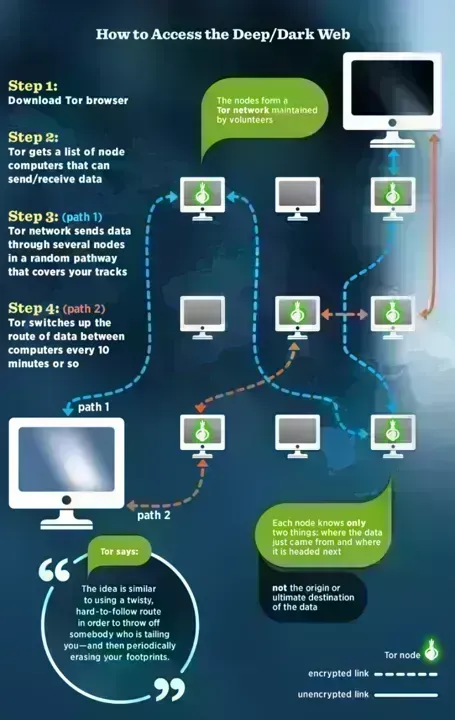



When people hear "dark web," they often think of hackers, illegal activity, and secret online worlds. While there’s some truth to that, there’s also a lot of misunderstanding. So what exactly is the dark web? Should students be worried? Let’s break it down in a way that makes sense.
The dark web is a part of the internet that isn’t indexed by traditional search engines like Google, Bing, or Yahoo. You can’t access it with a regular browser like Chrome or Safari.
It lives inside a broader part of the internet called the deep web, which includes things like:
Online banking pages
Private email accounts
Subscription-only services
School databases
The dark web, though, requires special software to access — most commonly a browser called Tor (The Onion Router).
To visit dark web sites, users need:
A Tor browser (free to download)
Knowledge of .onion links (these aren’t found on Google)
Sometimes, invitation codes or passwords
Here’s what people actually use the dark web for:
Whistleblowing & journalism: Some people use it to report corruption or government abuse anonymously.
Privacy protection: Users in countries with heavy internet censorship rely on the dark web for uncensored communication.
Academic research: Some cybersecurity researchers explore the dark web to study criminal activity or develop threat intelligence.
Stolen data: Credit cards, student IDs, and personal info are often sold here.
Drugs, weapons, or fake documents
Hacking services: Paid attacks on social media, websites, etc.
Adult content or illegal forums
Even if you’ve never visited the dark web, your data might already be there due to data breaches (e.g., school databases, Instagram, email accounts).
⚠️ For example, if you reused your school password on other sites, it could be floating around the dark web right now.
Avoid using the same password for multiple sites. A password manager helps.
Use websites like haveibeenpwned.com to see if your email has been in a breach.
Keep software updated, avoid suspicious links, and never share personal data casually online.
Curiosity is normal, but accessing the dark web out of boredom can expose your device to malware or get you into serious trouble.
If someone at school is involved in anything shady online — like buying hacked materials — report it. It could affect you too.
No, it’s not illegal to access the dark web or use Tor — but many activities on the dark web are illegal. Just visiting can expose you to sketchy stuff, malware, or surveillance. So it’s best to avoid unless you have a specific, legal reason and know how to stay secure.
The dark web isn’t a “myth” — it’s real, and it’s both fascinating and dangerous. For students, the best defense is awareness. Understand what it is, how it works, and how to keep your data from ending up there.
#trending #latest

University Internships That Help You Get a Job After Graduation... Read More.

Is It Smarter to Start at a Community College... Read More.
 Fake posts hit Czech PM Fiala's X
Fake posts hit Czech PM Fiala's X
Fake posts disrupt Czech PM Fiala's X account security
 Switzerland Tightens Export Rules
Switzerland Tightens Export Rules
Switzerland expands export controls on dual-use goods
 Google unveils Ironwood AI chip
Google unveils Ironwood AI chip
Google introduces Ironwood chip to accelerate AI tasks & apps
 TSMC Q1 revenue up 42%
TSMC Q1 revenue up 42%
TSMC sees 42% revenue surge in Q1, surpassing forecasts
 Amazon CEO Outlines AI Vision
Amazon CEO Outlines AI Vision
Amazon CEO reveals AI investment plans in new letter
 Osaka Hosts World Expo 2025
Osaka Hosts World Expo 2025
Japan blends tech and culture at Osaka Expo 2025 launch
 A16z Plans Big Bet on AI Startup
A16z Plans Big Bet on AI Startup
A16z may lead huge round in ex-OpenAI CTO’s new AI firm.
© MyEduGoal. All Rights Reserved. Design by markaziasolutions.com